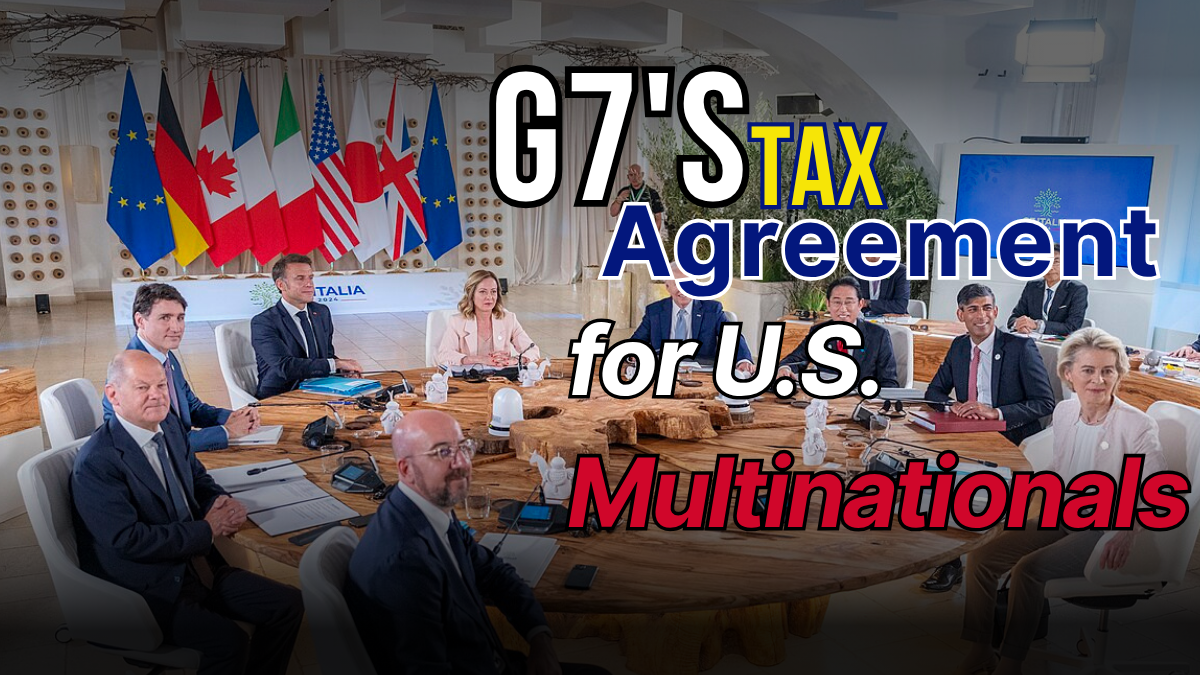The global taxation landscape is shifting, and at the center of recent developments is the Group of Seven (G7)’s agreement to exempt U.S. multinational corporations from specific aspects of the global minimum tax. This “side-by-side” tax deal, heavily supported by the U.S. and agreed upon by other G7 nations, aims to provide stability while addressing both domestic and international concerns.

What does this mean for U.S. firms operating globally? How will it impact the international tax framework? This article unpacks all you need to know about the agreement, its components, and wider implications.
G7’s ‘Side-by-Side’ Tax System
What Is the Side-by-Side Tax Deal?
The “side-by-side” tax framework allows U.S. multinationals to avoid paying additional taxes to foreign governments. Essentially, these companies will only be taxed on their global profits in the U.S., avoiding what many viewed as the extraterritorial reach of the global minimum tax system previously agreed upon by over 140 countries under the OECD initiative.
The U.S. government, alongside G7 members like Canada and the United Kingdom, touted the system as a stabilizing measure to ensure tax certainty while addressing concerns around aggressive global taxation policies.
Key Changes in U.S. Policy
A notable aspect of this agreement was the removal of “Section 899,” a retaliatory tax provision that was part of President Donald Trump’s domestic tax reforms. This clause would have imposed additional levies on foreign businesses operating in the U.S., in response to the global minimum tax rules. Its removal was seen as a concession to ensure international cooperation.
Implications for U.S. Multinational Corporations
The Immediate Benefits
- Avoidance of Double Taxation: U.S. corporations will not face double taxation on their foreign earnings, as taxes paid domestically will be recognized as sufficient under this framework.
- Stability in Tax Planning: Multinational corporations can better predict their tax liabilities, enabling a more stable environment for long-term investment planning.
Industries Poised to Benefit
Tech giants like Amazon, Meta, and Google stand to gain significantly from this arrangement due to their exposure to digital services taxes imposed by various nations. Additionally, large manufacturing firms and banks with a global footprint will also benefit from reduced overseas tax obligations.
Why Was the Deal Necessary?
The global minimum tax, set at 15%, aimed to prevent profit shifting and base erosion. However, U.S. multinationals, already subject to domestic minimum tax laws like the Global Intangible Low-Taxed Income (GILTI) provisions, argued this created an unfair burden on their operations.
The G7 agreement acknowledges these existing laws while committing to further dialogue on global taxation rules. This move was necessary to avert tensions and potential tax wars between major economies.
Criticisms and Challenges
While the “side-by-side” framework addresses concerns of U.S. corporations, not everyone is on board.
- Uneven Taxation: Critics argue that exempting U.S. firms could create an uneven playing field, disadvantaging companies headquartered in countries still bound by the global minimum tax.
- Digital Services Taxes: The deal only partially addresses the contentious issue of digital taxes levied by countries like France, leaving room for disputes.
- OECD Coordination: Although the G7 agreement is significant, the OECD and G20’s buy-in will be crucial to ensure broad acceptance and implementation.
Broader Impacts on Global Tax Cooperation
This agreement marks a significant shift in international tax diplomacy. By prioritizing domestic tax systems, the G7 creates a precedent that may influence future negotiations across broader multilateral forums like the G20.
Additionally, the deal highlights a move towards reconciling domestic priorities with international cooperation, a crucial balance in today’s interconnected economy.
What’s Next?
For Businesses
U.S. firms should closely monitor the ongoing discussions at the OECD and G20 levels to assess any further developments that may impact their tax strategies. Incorporating AI-driven tools to streamline tax compliance and planning could also ensure preparedness for policy changes.
For Policymakers
Ensuring transparency and creating robust mechanisms to address unresolved issues like digital taxes will be key to maintaining international trust.
FAQs About G7 Policy
Q. What is the G7’s tax deal?
A. The G7’s tax deal establishes a framework to ensure that large multinational corporations, including U.S.-based companies, pay a fair share of taxes in the countries where they operate. It aims to reduce tax avoidance and foster global tax stability.
Q. How does this affect U.S. multinationals?
A. U.S. multinational corporations will now be subject to new rules that limit profit shifting to low-tax jurisdictions. This could lead to increased tax burdens but also creates a more transparent and stable tax environment.
Q. What is the global minimum tax rate?
A. The global minimum tax rate proposed under this agreement is set at 15%. It applies to the profits of multinational corporations, ensuring a baseline level of taxation worldwide.
Q. Will this impact small and medium-sized businesses?
A. No, the tax deal primarily targets large multinational corporations and is unlikely to affect small and medium-sized enterprises.
Q. When will the new tax rules take effect?
A. The timeline for implementation may vary, but participating countries are working to adopt these reforms in the coming years as part of a coordinated effort.
Q. What are the benefits of this tax deal?
A. The tax deal promotes fairness by preventing tax avoidance, encourages global economic stability, and reduces harmful tax competition between countries. U.S. policymakers and corporations have a critical role in ensuring its successful implementation.
Final Thoughts
The G7’s side-by-side tax agreement represents a delicate compromise aimed at balancing U.S. domestic tax policies and global economic stability. While challenges remain, the deal signals a significant step towards a less contentious global tax framework.
For U.S. corporations and policymakers, this represents both an opportunity and a responsibility to shape a fair and forward-looking international tax environment.
For More Information Click Here